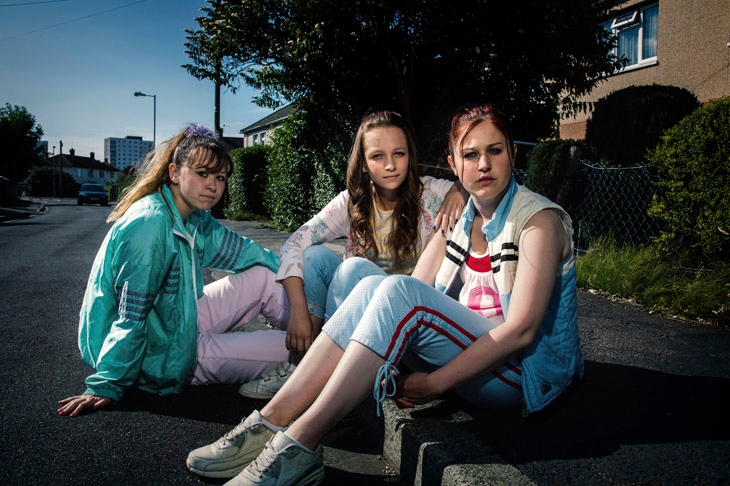I’ve often thought that a good idea for an authentic TV cop show would be to portray the police as neither dazzlingly brilliant (the traditional approach) nor horrifically corrupt (the traditionally subversive one) — but just a bit hopeless at solving crimes. There is, though, one thing that prevents the idea from being as original as I’d like: this is how the police already come across in many true-life dramas.
Take, for instance, the harrowing and — given its high-profile scheduling — extremely brave Three Girls (BBC1, Tuesday to Thursday), which provided an unsparing and wholly believable account of the Rochdale child-grooming scandal.
The first episode opened in 2008 with 15-year-old Holly (an astonishing performance by Molly Windsor) being interviewed by the police for smashing up a kebab shop — and, in flashback, telling them why. The shop concerned was where she’d regularly been going with two exciting-seeming new friends after moving to Rochdale from Derby. There, they’d met a group of Asian men, led by a twinkling fat man known as Daddy, who’d given them free food, booze and cigarettes. At first this (understandably) felt like good transgressive teenage fun — before Daddy demanded sex, explaining to Holly, in the tone of one patiently addressing a halfwit, that after ‘all these things I’ve given you, it’s part of the deal.’ He then raped her.
Faced with this revelation, the police officer spent a little time yawning, but eventually rallied enough to question Holly about her past sex life. Admittedly, Daddy did get arrested, but while out on bail he was free to threaten her into silence. The charges were dropped and normal service was not so much resumed as intensified, with Holly and her friends driven to ‘parties’ where they were passed around the assembled middle-aged men. Fortunately, Sara, a local sexual-health worker, worked out what was going on, collected statements and presented the police with full details of the crimes, the victims and the perpetrators. And with that, the cops finally snapped into action — by arresting Holly’s friend Amber for inciting girls into prostitution.
Not until two years later did Greater Manchester Police come up with the revolutionary idea of trying to catch the guilty men. But by now they needed the testimonies of girls who’d already been through the trauma of giving evidence only to experience the trauma of not being believed. Somehow, Three Girls managed to make the process of gaining their trust feel both authentically slow and intensely dramatic. And even after the happy ending of guilty verdicts all round, the programme didn’t lose its sense of perfectly controlled anger, as the various agencies who’d so catastrophically let the girls down rushed to cover themselves.
More than once, it was suggested that the police were reluctant to investigate Asian men for fear of encouraging racism. Yet if the BBC was scared of the same thing (and my guess is that it must have been) the finished programme was courageous enough to present the criminals’ ethnicity as simply an indisputable if uncomfortable fact.
Not, of course, that this will necessarily mean that Three Girls won’t come under attack from certain groups. In 2012, for example, Tom Holland’s Islam: The Untold Story — a gentle, impeccably scholarly examination of early Muslim history that cast some carefully nuanced doubts on orthodox beliefs about Muhammad and the Koran — earned him what he described as ‘a firestorm of death threats’.
In the circumstances, then, Holland perhaps can’t be blamed for taking an even more tentative approach to his own material in Isis: The Origins of Violence (Channel 4, Wednesday). Naturally, it’s in the interest of both other Muslims and the west to regard Isis’s claim to represent true Islam as a terrible perversion of a great religion. But, Holland began by wondering, is that true? Or might it be that Isis members really are faithful to Islam in its purest form?
His overall answer was a firm ‘let’s not be too hasty here.’ On the one hand, there are injunctions to violence in the Koran. On the other, they’re only one strand in a complicated story, of which other interpretations are equally valid.
Still, if his central argument wasn’t hugely revealing, Holland did make plenty of sharp historical points. In one of the more startling, he noted several similarities between Isis and French revolutionary Paris, birthplace of the west’s beloved human rights. There, too, beheading was used as public spectacle, as well as a way of punishing unbelievers. There, too, the beheaders’ ultimate aim was to spread their superior values throughout the world.
Overall, Wednesday’s programme proved an unusually well-informed and at times intellectually thrilling watch. But, like Islam: The Untold Story, its underlying sense of nervousness also made you want to travel to some parallel universe in which Tom Holland was able to say exactly what he thinks.






Comments